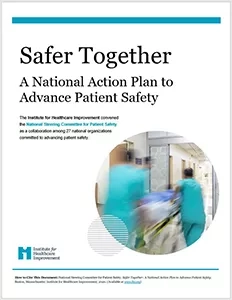National Action Plan to Advance Patient Safety
National Action Plan to Advance Patient Safety
A Total Systems Approach to Safety
Despite substantial effort over the past 20 years, preventable harm in health care remains a major concern in the United States. Though many evidence-based, effective best practices related to harm reduction have been identified, they are seldom shared nationally and implemented effectively across multiple organizations.
Reducing preventable harm requires a concerted, persistent, coordinated effort by all stakeholders, and a total systems approach to safety. Total systems safety requires coordination at many levels, which in turn necessitates robust collaboration among all stakeholders.
By harnessing the knowledge and insights of influential federal agencies, leading health care organizations, patient and family advocates, and respected industry experts into a set of actionable and effective recommendations, Safer Together: A National Action Plan to Advance Patient Safety (NAP) provides clear direction for making significant advances toward safer care and reduced harm across the continuum of care.
By planning and investing together, mobilizing resources together, learning together, and sharing lessons learned, we can drive meaningful change and advance the goal of creating the safest health care for patients and those who care for them.
Safer Together: A National Action Plan to Advance Patient Safety

Safer Together: A National Action Plan to Advance Patient Safety provides clear direction and 17 recommendations that health care leaders, delivery organizations, and associations can use to make significant advances toward safer care and reduced harm across the continuum of care.
The report harnesses the knowledge and insights of the National Steering Committee for Patient Safety (NSC) members, including influential federal agencies, leading health care organizations, patient and family advisors, and respected industry experts, into a set of actionable and effective recommendations to advance patient safety.
The National Action Plan centers on four foundational and interdependent areas, prioritized as essential to create total systems safety:
- Culture, Leadership, and Governance
- Patient and Family Caregiver Engagement
- Workforce Safety and Well-Being
- Learning System
The recommendations in these four areas build on the substantial body of experience, evidence, and lessons learned that the NSC has gathered and will test and implement together to allow for future refinements as our understanding, experience, and evidence evolve over time.
Self-Assessment Tool
The Self-Assessment Tool, a supplemental resource to the National Action Plan, assists leaders and organizations in identifying where to begin their patient and workforce safety improvement journey. The assessment was updated in 2024 to incorporate the latest insights and best practices from global safety initiatives. The tool is available as both a downloadable PDF document and in an online format — learn more and get started with your online assessment.
Self-Assessment Tool User Guide
The Self-Assessment Tool User Guide offers more detailed insights, interpretations, and guidance for completing the National Action Plan Self-Assessment Tool.
Implementation Resource Guide
The Implementation Resource Guide, a supplemental resource to the National Action Plan, details specific tactics and supporting resources for implementing the National Action Plan recommendations.
Declaration to Advance Patient Safety
In May 2022, the NSC issued the Declaration to Advance Patient Safety to urge health care leaders across the care continuum to recommit to advancing patient and workforce safety with a total systems approach, as presented in the National Action Plan.
Additional Support
IHI Safer Together Recognition Program
Celebrate your organization's commitment to advancing quality and safety. The IHI Safer Together Recognition Program acknowledges the achievements of hospitals that have made significant strides to improve patient and workforce safety by implementing proactive changes in systems and processes.
Learn More
IHI Safer Together Recognition Program
IHI Safer Together Recognition Program
Celebrate Your Team's Dedication to Patient and Workforce Safety
Your moment to shine as a beacon of inspiration in health care improvement is here! The Institute for Healthcare Improvement (IHI) invites all hospitals committed to advancing quality and safety to participate in the IHI Safer Together Recognition Program.
The IHI Safer Together Recognition Program acknowledges the achievements of hospitals that have made significant strides to improve patient and workforce safety by implementing proactive changes in systems and processes.
The Recognition program is grounded in IHI’s proven methodologies for quality and safety improvement and based on the principles outlined in the publication Safer Together: A National Action Plan to Advance Patient Safety, which focuses on four foundational areas:
- Culture, Leadership, and Governance
- Patient and Family Caregiver Engagement
- Workforce Safety and Well-Being
- Learning System
Why This Recognition Matters
The IHI Safer Together Recognition Program is built around a widely recognized framework for advancing safety. It offers tremendous value and opportunities to health care leadership, quality and safety improvement professionals, and individual hospitals.
Achieving this acknowledgment from IHI, a global leader in health care improvement, enhances a hospital’s reputation among peers, regulators, health care consumers, and the public. Recognition may also contribute to additional funding opportunities, higher workforce satisfaction, and better team performance.
Recognition provides a signal for patients/consumers and workers that their hospitals have attested to leadership commitment to safety and have structures and practices in place that are associated with high-performing organizations.
Recognition Program Details
To be considered for Recognition, a hospital must undergo rigorous and comprehensive self-assessment, ensuring that they have critically evaluated their safety practices.
Honoring evidence-based practices and driving real-world impact in safety management systems and safety culture, the IHI Safer Together Recognition Program awards hospitals for their continuous work to ensure that health care is safe and reliable as identified through a combination of quantitative and qualitative assessments.
- Online Team Self-Assessment Tool: Meet or exceed a specific threshold on the online Team Self-Assessment Tool for Safer Together: A National Action Plan to Advance Safety.
- IHI Safety Expert Panel Verification: Hospitals will receive verification by the IHI Safety Expert Panel, comprising nationally recognized patient and workforce safety experts.
Review and Recognition Process
To be considered for the IHI Safer Together Recognition Program, hospitals must follow the process described below.
- No fewer than five (5) leaders must complete the online Team Self-Assessment Tool for Safer Together: A National Action Plan to Advance Safety.
- Team members should include safety/quality/risk leaders, chairs of key committees (e.g., governing body, quality/safety committee, Patient and Family Advisory Committee).
- More than one of these leaders must be a C-suite leader (e.g., CMO, CNO, CFO, CEO).
- Hospitals that meet or exceed a certain quantitative threshold on their online Team Self-Assessment Tool will receive an invitation via email to complete a Qualitative Verification Assessment. The Verification Assessment includes the upload of documents (e.g., policies) and attestations from the hospital’s senior leader or CEO, which verify the quantitative score received on the online Team Self-Assessment Tool.
- IHI Safety Expert Panel reviews the assessments.
- Hospitals receive email notification of the IHI Safety Expert Panel’s decision.
- Hospitals awarded Recognition pay the Recognition fee of $5,000 per hospital.
Acknowledgment of intent to pay the Recognition fee must be received within 30 days of conditional Recognition notification email, and invoice paid within 30 days of invoice receipt, to claim Recognition status and receive the benefits listed below.
IHI is pleased to recognize health care organizations of all sizes and offers special pricing for the Recognition fee to the following organizational types (identification of organizational type occurs during Verification Assessment):
- Critical Access Hospitals
- Hospitals with 50 or fewer beds
- Members of America’s Essential Hospitals
- 501(c)(3) organizations with a defined operating budget of less than $5 million, serving community-based organizations
- Ministries of Health
- Faith-based health institutions
Take the First Step Toward Recognition: Complete the Team Self-Assessment Tool
To be considered for the IHI Safer Together Recognition Program, at least five leaders from your hospital (including more than one C-suite leader) must start the process by completing the online Team Self-Assessment Tool.
Get StartedRecognition Cycles
Recognition is awarded quarterly, for a duration of two years. The Recognition cycle timeframes are noted below.
| Team Self-Assessment Tool and Verification Assessment Complete By: | Hospital Notified of Recognition Decision | Two-Year Recognition Cycle |
|---|---|---|
| April 30, 2025 | July 1, 2025 | July 1, 2025 – June 30, 2027 |
| July 31, 2025 | October 1, 2025 | October 1, 2025 – September 30, 2027 |
| October 31, 2025 | January 1, 2026 | January 1, 2026 – December 31, 2027 |
| January 31, 2026 | April 1, 2026 | April 1, 2026 – March 31, 2028 |
Recognition Benefits
Hospitals awarded IHI Safer Together Recognition receive*:
- Acknowledgment as a “Recognized Hospital” on IHI’s website and in marketing materials.
- The Official Badge of Recognition shared with hospitals for use in digital communications, including marketing and social media.
- 15% discount for staff to attend the IHI Patient Safety Congress (starting in 2026).
*Upon approval and invoice payment
Need Help or Have Questions?
Email our team at safertogether@ihi.org
IHI Patient Safety Learning Series
Expert-led sessions give health care professionals the knowledge to integrate the CMS Patient Safety Structural Measure (PSSM) into their daily operations. This learning series engages health care leaders and teams with practical tips, hands-on tools, and real-world examples to implement effective strategies and achieve measurable progress in patient and workforce safety. Join the complimentary first webinar on April 30.
Learn More
Certified Professional in Human Factors in Health Care Review Course: Live Webinar March
*Prices are listed in USD
Please review our Cancellation Policy below.
Not receiving IHI emails? Please ask your IT department to add the ihi.org domain to your organization's Safe Senders list.
Prepare for the CPHFH Exam by Reviewing Content Areas and Test-Taking Strategies
About Certification
The Certified Professional in Human Factors in Health Care (CPHFH) credential is earned by demonstrating a high level of proficiency in applying the core standards of human factors, systems thinking, and design to health care improvement. The CPHFH credential distinguishes health care professionals who meet the competency requirements in the areas of human factors and who demonstrate the ability to apply this knowledge to plan and implement human factors initiatives effectively.
Agenda
This program consists of 2 live virtual sessions from 12:00 PM – 4:00 PM ET.
| Day 1 | Day 2 |
| Welcome and Introductions | Macroergonomics |
| Assess and Analyze | Design Process |
| Task Analysis | Solutions |
| Proactive Safety Methods | Research Methods |
| Test-taking strategies, Q&A, practice questions |
Cancellation Policy
All cancellation requests may be submitted in writing at certification@ihi.org. Requests received 72 hours (3 business days) before the scheduled start time will receive a full refund. Refund requests submitted less than 72 hours (3 business days) before the scheduled start time will be ineligible for a refund.
Handouts
Handouts for this course will be sent to registered course attendees a few days before the course date. Handouts will not be given onsite for live courses; therefore, attendees are responsible for printing or downloading them before the course. Attendees are encouraged to bring their computers to the live courses.
Need Help?
Email certification@ihi.org



